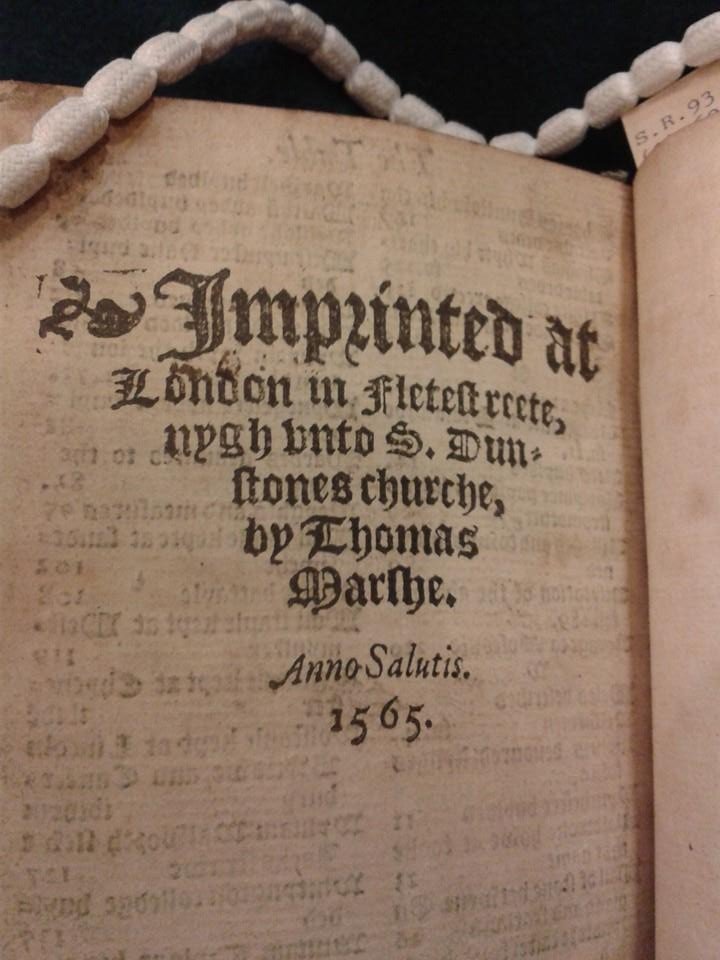With the celebration of the 450th anniversary of the birth of William Shakespeare this year, this series of blogs will explore events and everyday life for every 50 years since, using items from across our collections. It makes sense to start at the beginning, around the year of 1564 when Shakespeare was born.

Holy Trinity Church’s parish register contains the baptism of William Shakespeare which is recorded on 26th April 1564. The register also holds records of marriages and deaths for the same period. When you look at the burial register for the same period as Shakespeare’s birth in 1564, you can see the phrase “hic incepit pestis”. Before this phrase appears, each month has relatively few burials; however, after this phrase, the numbers rapidly accelerate. The Latin means, “here began the plague”. The plague devastated Britain in 1564 and we are lucky that Shakespeare survived being born at the time. More than 200 people died in Stratford, which was around 1/6th of the population.

This child's feeding bottle is an example of Hispano-Moresque pottery; it was probably produced in Spain and dates to the 15th -16th Century. It is incredible to think that a child in Shakespeare’s time (or even Shakespeare himself!) may have been fed using a bottle such as this, especially as it is so different from the sterile, plastic bottles that we are used to seeing today. The bottle creates a wonderful insight to childhood during the 15th - 16th Century, and allows us an idea of the types of material culture that Shakespeare may have interacted with as an infant.
Published in 1565, John Stow’s A Summarie of Englyshe chronicles... gives us an interesting insight into life at the time and how history was written up to that point in time. The full title is:
A summarie of Englyshe chronicles conteynyng the true accompt of yeres, wherein euery kyng of this realme of England began theyr reigne, howe long they reigned: and what notable thynges hath bene doone durynge theyr reygnes. Wyth also the names and yeares of all the baylyffes, custos, maiors, and sheriffes of the citie of London, sens the Conqueste, dyligentely collected by Iohn Stovv citisen of London, in the yere of our Lorde God 1565. Whervnto is added a table in the end, conteynyng all the principall matters of this booke. Perused and allowed accordyng to the Quenes maiesties iniunctions.

John Stow was an English historian and antiquarian best known for his 1598 Survey of London. A summarie of Englyshe chronicles... is a small volume which details English history from as far back as Roman Britain, taking it right up to date, to the reign of Queen Elizabeth I. He finishes with the phrase “Thus good reader I have brought as thou seest this small abridgement or summary of our English Chronicles, to these our present days...where I beseech thee to judge favourably, and to correct friendily, so as thy correction may rather be an instruction than a condemning of me”.
The book also contains useful information such as “how a man may journey from any notable town in England, to the city of London or from London to any notable town in the same realm”, the number of days in each month, and on which date significant events would take place (such as Easter Day) for the following 30 years.
This book is an interesting example of how history was recorded at the time and brought together into chronicles. More comprehensive chronicles would follow such as Halle’s and Holinshed’s, which were used by Shakespeare as source materials for his history plays and Macbeth.

With thanks to Emily Millward for the information on the child's feeding bottle.
